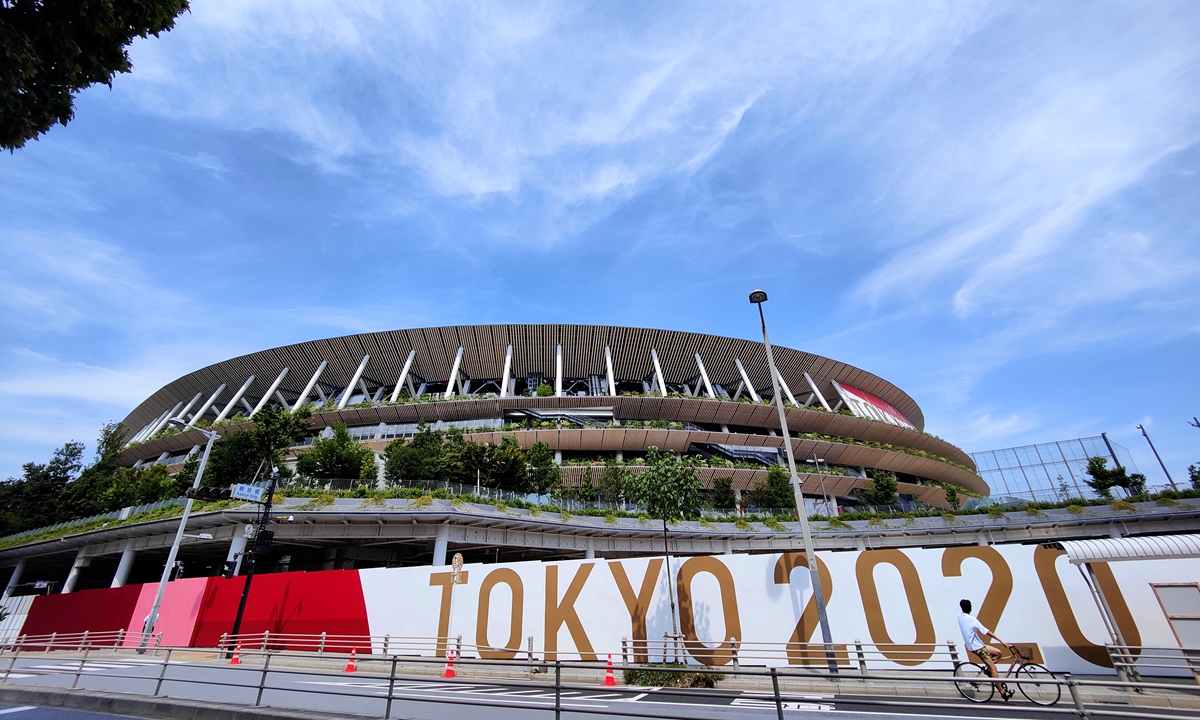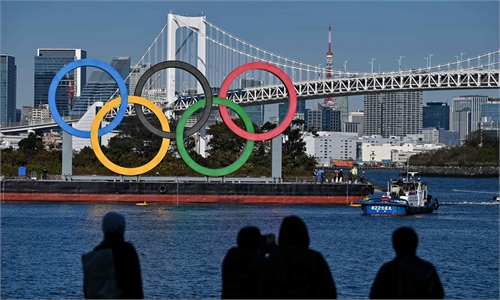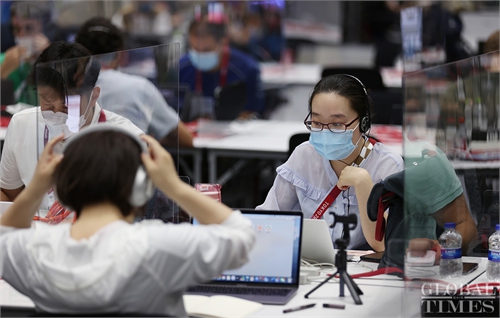SPORT / OLYMPICS
Olympics set for unusual opening ceremony
Director fired over Holocaust joke on Games eve

A view of the National Stadium in Tokyo Photo: VCG
On the eve of the Tokyo Games, organizers fired the director of the opening ceremony over a joke he made about the Holocaust, while media reported former Prime Minister Shinzo Abe, a staunch advocate for the Tokyo Games, would skip the showpiece event.The news is the latest in a series of embarrassments for Tokyo organizers that have sparked outrage and comes just days after a well-known musician was forced to step down as composer for the ceremony after old reports of his bullying and abusive behavior surfaced.
Earlier this year, the head of the Tokyo 2020 organizing committee resigned after making sexist remarks and Tokyo Olympics creative head followed after he made derogatory comments about a popular Japanese female entertainer.
Tokyo Games organizers fired Kentaro Kobayashi on Thursday over a joke he made about the Holocaust as part of his comedy act in the 1990s that recently resurfaced in domestic media.
"I offer my deep apology for causing trouble and worry for many people concerned as well as Tokyo residents and Japanese people when the opening ceremony is almost upon us," said a somber Seiko Hashimoto, who heads the organizing committee.
Earlier, the Simon Wiesenthal Center, an international Jewish human rights organization, released a statement saying Kobayashi's association with the Olympics would "insult the memory" of the six million Jewish people who perished in the Holocaust.
Kobayashi apologized for his past comments in a statement.
Abe not attending
Former Japanese prime minister Abe, who famously dressed up as the titular plumber from video game Super Mario at the Rio Games to represent Japan, played an outsized role in attracting the Olympics to Tokyo.
At the time of the bid, Abe and his supporters hoped the Olympics would parallel the 1964 Tokyo Games heralding the nation's revival after decades of economic stagnation and also mark its recovery from a devastating nuclear and natural disaster in 2011.
But the spectacle of last-minute personnel changes, the resurfacing of past abusive comments and the looming presence of the pandemic threatened to turn the Olympics into a "PR disaster," said Bob Pickard, a veteran PR executive at Signal Leadership Communication.
"Tokyo 2020 was supposed to be a global platform for the launch of a new Japan facing an international future with confidence. Instead, what we see here is the legacy of the old Japan's insular attitudes mired in past prejudices and dated stereotypes," he said.
NHK said Abe decided against attending the ceremony after the Japanese government declared a state of emergency and virus restrictions over Tokyo.
Abe's office could not immediately be reached on Thursday, a public holiday in Japan.
The opening ceremony on Friday is set to be a subdued affair, with just 950 people - including only around 15 global leaders - will be present at the 68,000-seat National Stadium in Tokyo.
Olympic flame
The opening ceremony's focal point is the lighting of the Olympic cauldron, which will conclude a tortuous torch relay that started 16 months ago and has run into several obstacles.
After the flame was lit at a spectator-free ceremony in Olympia, Greece in March last year, the Greek section of the relay was scrapped when a crowd mobbed Hollywood actor Gerard Butler in Sparta.
The flame had barely landed in Japan when the Olympics were postponed and it was put on display around the nation until the relay's restart this March.
However, almost half of the relay legs were taken off public roads or otherwise altered over coronavirus concerns, and fans were kept away when it finally arrived in Tokyo this month.
Glimpses of rehearsals witnessed by Tokyo residents suggest a high-tech show including a drone display.
Japan's Emperor Naruhito will be chief among the VIPs.
US First Lady Jill Biden was expected to arrive in Tokyo on Thursday afternoon for the Games' opening ceremony, raising expectations she might also use her attendance to discuss vaccines with Prime Minister Yoshihide Suga.
US President Joe Biden has been traveling across the United States urging more people to get inoculated.
Only one-third of Japanese have had at least one dose of the vaccine, fuelling public concerns that the Olympics could become a super-spreader event.
Spectators have been barred from most Olympic events as COVID-19 cases surge in the capital.
Not in the village
In a recent poll, 68 percent of respondents expressed doubt about the ability of Olympic organizers to control coronavirus infections, with 55 percent saying they opposed the Games going ahead.
Already 87 Olympic-related personnel, including athletes, have tested positive for COVID-19, forcing athlete withdrawals and pushing teammates to isolate.
In light of new cases reported in the Olympic village, the US gymnastics team moved into a hotel, a coach said in a Twitter exchange earlier this week.
Olympic organizers referred questions on the topic to the US team.
Olympics competition has already begun, with the Japanese women's softball team getting the hosts off to a winning start on Wednesday.
Between matches in rural Fukushima, which was devastated by the 2011 nuclear disaster, softball players were on the lookout for a brown bear which had been spotted this week.
"I'm kind of disappointed I didn't get to see it," US pitcher Monica Abbott said.


